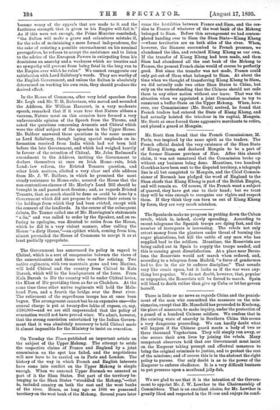On Tuesday the Times published an important article on the
subject of the Upper Mekong. The attempt to settle the respective claims of France and England by a joint commission on the spot has failed, and the negotiations will now have to be carried on in Paris and London.. The history of the way in which French and English interests have come into conflict on the Upper Mekong is simple enough. When we annexed Upper Burnish we annexed as part of it the Shan States. But part of the territory be- longing to the Shan States " straddled the Mekog,"—that is, included country on both the east and the west banks of the river. Hence, as long ago as 1886 we possessed territory on the west bank of the Mekong. Several years later came the hostilities between France and Siam, and the ces- sion to France of whatever of the west bank of the Mekong belonged to Siam. Before this arrangement we had contem- plated banding over to Siam the Shan State—Kiang Kheng —whose territories are on both sides of the river. When, however, the Siamese succumbed to French pressure, we abandoned the idea, and retained Kiang Kheng as our own.. If the transfer of Kiang Kheng had been made, and them Siam had abandoned all the east bank of the Mekong to- France, the present French claim would of course be perfectly good. But since the transfer was not made, France could only get out of Siam what belonged to Siam. At about the time when we thought of transferring Kiang Kheng to Siam, we did actually cede two other Shan States to China, but only on the understanding that the Chinese should not cede them to any other nation without our leave. That was the situation when we appointed a joint Commission to try to construct a buffer-State on the Upper Mekong. When, how- ever, our Commissioner (Mr. Scott) arrived, he found that French traders had entered the State of Kiang Kheng, and had actually hoisted the tricolour in its capital, Mongsin. Mr. Scott at once forced these aggressive merchants to retire,. and placed a guard at Mongsin.


































 Previous page
Previous page